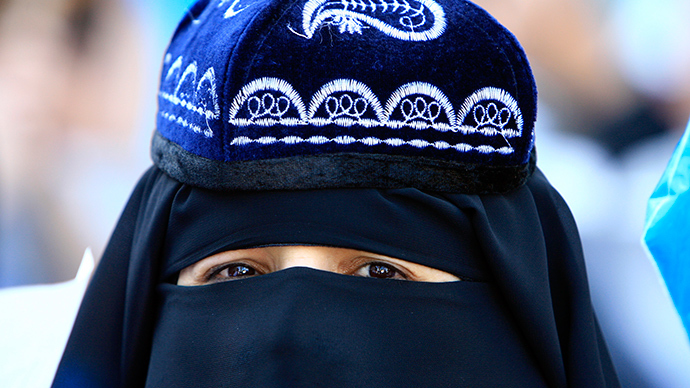Full-face Islamic veil banned in China’s Uighur region

The capital of China’s western Xinjiang region – home to its Uighur Muslim minority – has banned the wearing of veiled Islamic robes in public amid pressure from Beijing to crack down on religious extremism, the regional government said on Thursday.
According to the official website of the Xinjiang government, the
ban was “considered and approved” by the Urumqi parliament’s
standing committee.
China is becoming increasingly concerned about Islamist
extremism, with experts worried that it may create unrest in the
troubled region.
Uighurs – the dominant Muslim minority in Xinjiang – mostly
practice a moderate form of Sunni Islam, but recently many have
begun taking up practices more commonly followed in Saudi Arabia
or Pakistan, such as making women wear a full face veil.
Experts say the decision to outlaw the face veil will further
stigmatize the minority Uighurs.

The ban would “make the veils more popular as a symbol of
resistance and assertion of ethno-national identity,” James
Leibold – an expert on China’s ethnic policy from Melbourne’s La
Trobe University – told Reuters.
"This fits into the larger pattern, keeping up with the trend
in the past five years that has really intensified in the last
year by the government to try to forcibly reshape and standardize
the type of garment among the Uighur females," he added, as
quoted by AP.
The Uighurs, who speak a Turkic language, have been beset for
years by violence which the Beijing government blames on Islamist
militants.
The latest announcement comes just one month after Xinjiang
banned the practicing of religion in government buildings, as
well as wearing clothes or logos associated with religious
extremism.
In August, the northern Xinjiang city of Karamay prohibited young
men with beards and women in burqas or hijabs from boarding
public buses.
Police have also raided women’s dress shops in the province to
confiscate full length robes, AP reported.
In 2013, the East Turkestan Islamic Movement – which is listed as
a terrorist group by the UN – produced 107 terror-related audio
and video materials.
Turkestan is an area of northwest China. It was formed by Uighur
militants whose stated aim is independence from China.
In response to the increasing threat, Xinjiang began a one-year
campaign against terror-related violence in May, which will last
until June 2015.
China is also facing a growing threat from ISIS. In July, Wu
Sike, China’s special envoy to the Middle East, said that up to
100 Uighurs from Xinjiang may be fighting alongside the militant
group.












